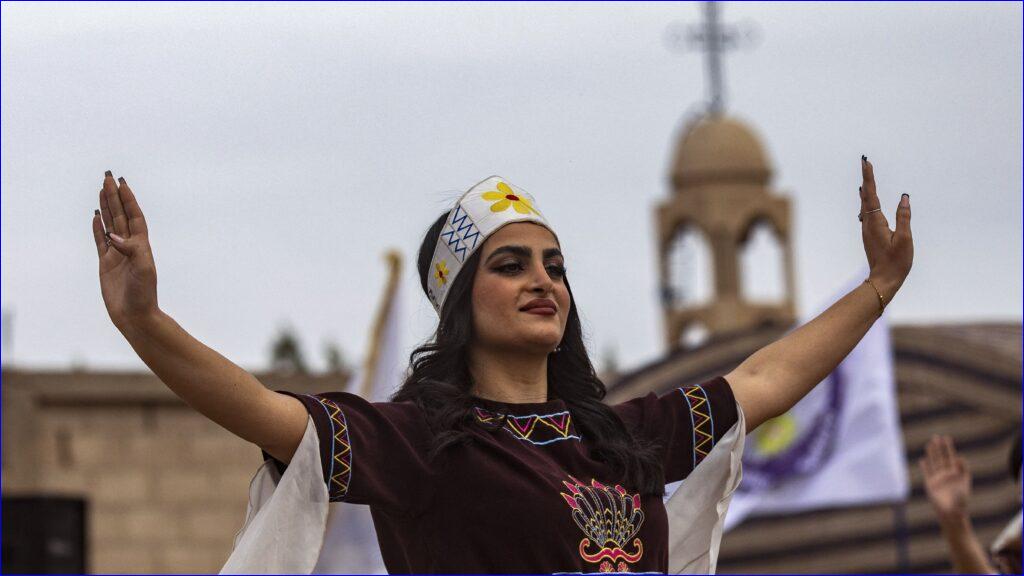


 Delil Souleiman/AFP)
Delil Souleiman/AFP)
Scholars participating in the conference and one of the organizers, Kyriacos Batsaras, who is the head of the Assyrian Union of Greece, called on the government of Greece to officially recognize the Assyrian genocide. Batsaras told europeanconservative.com: “We believe it is crucial for our people that Greece formally acknowledges the Genocide. Firstly, because the struggles of the Assyrians of Greece will be finally vindicated and secondly, because when this happens, Greece will be among the European Union countries that will have officially recognized the Assyrian Genocide.”
Related: The Assyrian Genocide
Assyrians speak a language called Assyrian/Aramaic (sometimes referred to as Syriac or Neo-Aramaic) and trace their heritage to ancient Assyria. Jesus of Nazareth primarily spoke Aramaic, specifically a Galilean dialect, which was the common regional language during his time.
The Assyrians, a native people of modern-day Iraq, Turkey, Syria, and Iran, were exposed throughout history to several massacres at the hands of Muslims. Historians record that the first massacre of Assyrians in modern times took place in the 1840s, in northern Mesopotamia. The Ottoman Turks allowed the Assyrians to be massacred by the Kurdish chieftain Badr Khan Bey, who summoned the surrounding Muslim population to an Islamic 'Holy War,' or jihad. From 1914 to 1924, Assyrians--alongside Greeks and Armenians--were victims of a genocide in Ottoman Turkey, leaving around 300,000 Assyrians dead and innumerable women abducted. Assyrians call this crime 'seyfo,' which means 'sword' in the Assyrian language, for swords were widely used to murder the victims.
Assyrians are predominantly Christian and are still persecuted in Turkey, Iraq, Syria and Iran, where they currently live.
A press release issued at the conference by Sabro Bengaro, a genocide scholar and the founding president of Seyfo Center, and Kyriakos Batsaras, president of the Assyrian Union of Greece, said:
“During World War I, the Ottoman Empire orchestrated the systematic extermination of more than half of the Assyrian population. Most of the survivors were either executed, exiled, or forced to abandon their ancestral homeland … As the legal and political successor to the Ottoman Empire, the Republic of Turkey maintains a policy of denial, refusing to recognize the genocide perpetrated against its Christian populations--despite overwhelming historical documentation and scholarly consensus … Democratic nations and the international community must remain steadfast in their principles, urging Turkey to confront this painful past. Recognition should not be seen as a threat, but as a courageous and constructive step toward justice, reconciliation, and the full inclusion and equal treatment of all minorities within Turkish society," adding:
Ultimately, Turkey has the sovereign agency to choose the path of truth and moral responsibility. By acknowledging the genocides of the Assyrian, Armenian, and Greek peoples, Turkey can take a significant step toward historical accountability and meaningful integration into the global community--founded on the principles of human rights, dignity, and shared memory.
Even after the genocide, discrimination and violence against Assyrians continued in Turkey. In 1924 and 1925, Assyrians in the Hakkari region were exposed to yet another massacre. "Despicable acts, such as massacres, rape and looting," were committed against Assyrians, writes Professor Racho Donef.
Due to the increased violence they experienced in their ancestral homelands, the Assyrians began to emigrate to the West in the late 19th century. Emigration increased further from the early 20th century. Today, the Assyrian diaspora's population is estimated at around 3 to 5 million.
Turkey restricted the scope of the 1923 Treaty of Lausanne, which recognized the state's boundaries, to Armenians, Jews and Greeks. This has unlawfully excluded other non-Muslims, including Assyrians, from the treaty's protection. As a result, Assyrians do not have the right to education in their mother tongue nor the right to establish their own schools.
Under Turkish law, in the 1920s and 1920s, Assyrian villages were assigned Turkish names, reports Minority Rights Group.
Assyrians were also caught up in the conflict between the Turkish armed forces and the Kurdistan Workers' Party (PKK) during 1984-99. They suffered forced evictions, mass displacement and the burning down of their homes and villages. Internally displaced people (IDPs) were not offered adequate compensation or provided with alternative housing. The displaced were not allowed to return to their homes until 1999.
Several reports by human rights organizations have documented the ongoing persecution of Assyrians in Turkey, including abductions (including of priests), forced conversions to Islam through rape, forced marriage, and murders. These pressures, along with other more insidious forms of discrimination, have decimated the community.
Dr Anahit Khosroeva, a Harvard University visiting professor and a participant of the conference, told europenaconservative.com:
The official recognition of the Assyrian Genocide by Greece holds significant historical, moral, political, and diplomatic importance. Armenians, Greeks, and Assyrians were all subjected to genocide under the Ottoman Empire by the same regime, driven by shared nationalist and religious motives. In this context, recognition is not only a matter of historical accuracy but also one of solidarity and ethical responsibility.
Assyrian history
Assyria's legacy in world history and civilization is significant. For the 300 years between 900 and 600 BC, Assyrian kings ruled the largest empire the world had yet known. Assyria was located in the northern part of Mesopotamia, which corresponds to most parts of modern-day Iraq as well as parts of Iran, Kuwait, Syria, and Turkey. It was through the Assyrians that the ancient Greeks learned about Mesopotamian science and other knowledge, which had a major impact on Greek intellectual development.
Following the Islamic conquests of the region in the seventh century, Islamic persecutions against Assyrians and other non-Muslims in the Middle East has escalated and remains ongoing today. This ancient nation that has for centuries contributed significantly to civilization is today stateless.

or register to post a comment.